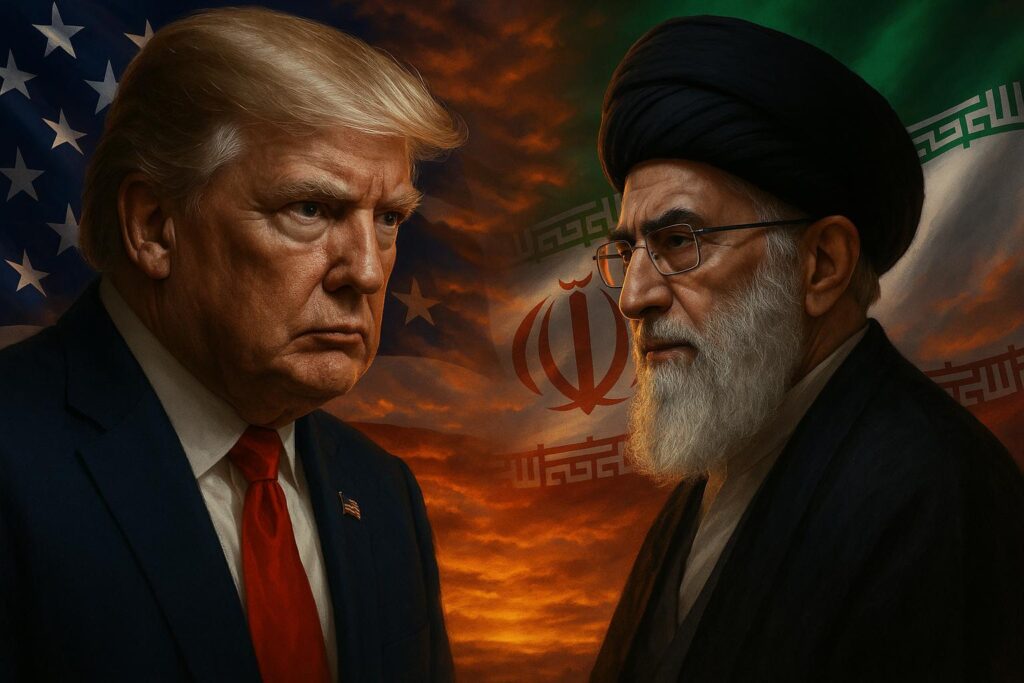With Operation Midnight Hammer, the United States has successfully degraded Iran’s nuclear program. While Iranian officials are threatening retaliation, Tehran lacks any meaningful options for an effective counterattack.
Yesterday’s coordinated U.S. assault marked the most significant direct American military action against Iran in modern history. The operation involved seven B-2 Spirit stealth bombers flying an 18-hour round-trip mission from Missouri, supported by over 125 total aircraft in what Pentagon officials described as the largest B-2 operational strike ever conducted. The targets—Iran’s nuclear facilities at Fordow, Natanz, and Isfahan—were hit with 14 Massive Ordnance Penetrator “bunker-buster” bombs and dozens of Tomahawk cruise missiles.
President Trump announced that Iran’s “key nuclear enrichment facilities have been completely and totally obliterated,” a statement corroborated by Pentagon assessments reporting “extremely severe damage and destruction” at all three sites. The operation was highly classified, with only a handful of people in Washington aware of its timing or nature. It achieved complete tactical surprise, no shots were fired at U.S. forces.
Notably, the strike came just days after President Trump had publicly stated that he would take two weeks to decide whether or not to launch an attack. Tehran, familiar with the pattern of previous U.S. administrations, assumed American threats were hollow and that Washington would never go as far as conducting a direct military strike.
For many in the United States, however, this attack was seen as long-overdue retaliation for 1979, when Iran’s Islamic revolutionaries stormed the U.S. Embassy in Tehran, taking 52 Americans hostage and holding them for 444 days. That crisis marked a tremendous humiliation for the U.S., and the 45 years that followed, absent of any direct retaliation, emboldened Iran to believe it could attack U.S. interests or thwart American policy without consequence.
Iran’s response has been predictably dramatic but strategically hollow. The Islamic Revolutionary Guard Corps (IRGC) threatened strikes on U.S. forces in the Middle East, claiming that “the number, dispersion, and size of U.S. military bases in the region are not a strength, but have doubled their vulnerability.” Iran’s Parliament also voted to approve closure of the Strait of Hormuz, though the final decision rests with the Supreme National Security Council.
These threats reflect desperation more than capability. While Iran possesses short-range missiles that can reach some regional U.S. bases, defense analysts agree that its ability to sustain military action is limited. Its options are described as minor “potshots,” not serious strategic retaliation. Israeli strikes in recent years have degraded Iran’s ballistic missile infrastructure and decapitated portions of its military command. Iran lacks the capacity for large-scale, sustained attacks on U.S. assets.
U.S. airstrikes on Iran’s nuclear facilities have raised fears of global energy disruptions, particularly through the Strait of Hormuz, a chokepoint for roughly 20% of global oil and gas flows. While Iran has the capability to mine the strait, seize vessels, or stage harassment attacks, past incidents—including the 1980s Tanker War and more recent ship seizures—have shown that such disruptions are typically brief and met with swift U.S. naval response. The U.S. Fifth Fleet, based in Bahrain, remains a powerful deterrent.
Moreover, there are practical constraints on Iran’s threat to close the strait. Much of the waterway lies in Omani territorial waters, and the strait is too wide for Iran to close entirely. Even a partial blockade would provoke devastating retaliation and alienate countries that currently oppose broader sanctions on Iran. Most critically, such a move would cut off Iran’s own economic lifeline.
That lifeline is already fragile. Approximately 90% of Iran’s oil exports go to China via heavily sanctioned “shadow fleet” tankers and small “teapot” refineries. These transactions are conducted in yuan, bypassing the Western financial system. Since this oil trade already operates outside formal global markets, threats to disrupt global oil flows lack credibility. Iran cannot cut off supplies it’s not widely selling. New U.S. Treasury sanctions on Chinese firms involved in this trade also show Washington’s ability to further choke Tehran’s limited revenue streams.
Finally, Iran stands alone strategically. Neither Russia nor China has offered meaningful military support. Russia’s deputy security council chair issued verbal condemnation of the strikes, and China has provided only generic diplomatic statements. Neither power appears willing to escalate on Iran’s behalf. Without international backing, Iran is isolated and strategically boxed in.
The reaction in the U.S. has been largely supportive. While some anti-interventionist conservatives voiced concerns, mainstream Republican leaders quickly rallied behind the strike. Speaker Mike Johnson praised Trump’s “strength, precision, and clarity,” Senator Lindsey Graham called it “the right call,” and Senate Armed Services Chairman Roger Wicker said Trump made a “deliberate—and correct—decision.” Even anti-interventionists like Steve Bannon suggested they might ultimately support the move. This unity undercuts any Iranian hope that domestic political divisions might restrain further U.S. action.
Strategically, Iran’s options are limited and increasingly symbolic. Their nuclear program has been crippled, their military command degraded by Israeli strikes, their economy under maximum sanctions, and their international support virtually nonexistent. Any attempt at retaliation, whether through regional harassment, missile attacks, or proxy strikes, would provoke overwhelming U.S. countermeasures without advancing Tehran’s objectives. Trump’s warning that “many targets remain” if Iran escalates underscores Washington’s upper hand. Iran’s threats may persist, but its ability to follow through remains constrained by military, economic, and geopolitical realities.
Read the full article here
